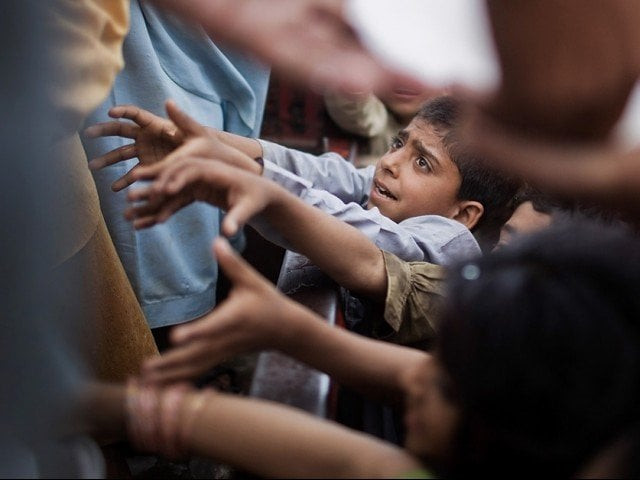Why poverty hasn’t reduced significantly in Pakistan
Govt-run programmes are often influenced by political considerations

PHOTO: REUTERS
Successive governments in Pakistan have also intentionally shied away from this debate. For example, the Pakistan Peoples Party government didn’t release poverty statistics for years it stayed in government.
Similarly, the PML-N hasn’t released poverty rates for its tenure. The poverty rate announced in 2016 by then Minister of Planning and Development Ahsan Iqbal was for the year 2013 when PML-N was voted into power. Clearly, political parties don’t intend to land in hot water by talking about poverty.
Academic studies on the subject further confound our understanding of poverty. There is considerable ambiguity around the methodology to estimate the rate of poverty. As a result, there is no single and well-accepted poverty rate in Pakistan. Each academic study on poverty estimation gives its own poverty rate that may be different from others. In some cases, there are significant differences between the calculated poverty rates.
Economic challenges aplenty, but very little time
However, according to the latest available official statistics, almost 30% of Pakistanis were living below poverty line of Rs3,030 per adult per month in 2013. This translates to roughly 59 million in absolute terms. The poverty line used by the government is totally absurd. How can we consider an adult as not poor who earns Rs3,030 per month? This casts serious doubts on the poverty rate reported by the government.
A more reasonable poverty line can be the international poverty line of $2 per day. As per this poverty line, a whopping 60% of Pakistanis are poor. Now another type of poverty rate called multidimensional poverty rate is also being calculated in Pakistan, which relies on non-income indicators. Here again, not many are aware of what is multidimensional poverty.
But poverty is the main reason why international development institutions like the World Bank finance variety of projects in Pakistan.
Pakistan has received millions of dollars in the name of poverty reduction. Varieties of economic policies are framed by the government under the pretext of poverty reduction.
Despite the fact that Pakistan has received a lot of money for fighting poverty from donor institutions; it hasn’t seen significant reduction in poverty levels. This is especially true when comparison is made with India and China. Both of these economies have experienced steep fall in their poverty levels. Pakistan’s progress in this area has been sluggish as best.
Pakistan’s approach to
poverty reduction
From 1951 till now, there hasn’t been a year when a government-led poverty reduction program wasn’t under way. The initial programmes were completely donor funded with focus on education and health of the rural economy. Overtime, some programmes under public-private partnership mode also started with a more varied focus like housing, roads, and sanitation.
In addition, government also adopted redistribution policies like land reforms, pricing of agricultural products, subsidies, social security payments, high tax rates and direct income transfers.
In the last few years, redistributive policies have become more popular with both people and the political parties. This shift in policy is influenced by a stream of literature which purports that poverty reduction can only be achieved if inequality is reduced using redistributive policies. Many local studies on poverty have also come up with the same idea.
Industry blames constant rise in debt for poverty, lack of development
Such policies place the government at the centre of the effort to redistribute economic gains to reduce poverty.
Failure of government
Focusing too much on programmes and redistributive policies has done more harm than good. Almost all of the programmes have fallen prey to government failure and corruption. The most recent example is that of the Benazir Income Support Program (BISP). Stories of corruption in BISP are common knowledge. The problem is that whenever a programme lands into political hands, political considerations always precede sound economic sense.
The BISP forms were given to PPP MNAs for distribution and naturally, those with strong political connections ended up having it over genuine individuals. Although it must be admitted that programmes run in collaboration with the private sector seem to produce better results than those run exclusively under the government’s watch.
On the other hand, the redistributive policies adversely affect the pricing mechanism. Support prices of key agriculture commodities creates glut-like situation which wipe out economic profits. Along with this, increasing tax rates on corporations in order to pay for welfare programs discourages businesses.
It won’t be wrong to conclude that government’s policies have stunted the impact of economic growth to reduce poverty significantly.
If Pakistan is to reduce poverty significantly, it must promote employment opportunities. The surest way to achieve that is by allowing businesses to employ more people. This can only be achieved if predatory redistributive policies are withdrawn.
The writer is a researcher and works in the development sector of Gilgit
Published in The Express Tribune, January 22nd, 2018.
Like Business on Facebook, follow @TribuneBiz on Twitter to stay informed and join in the conversation.



















COMMENTS
Comments are moderated and generally will be posted if they are on-topic and not abusive.
For more information, please see our Comments FAQ